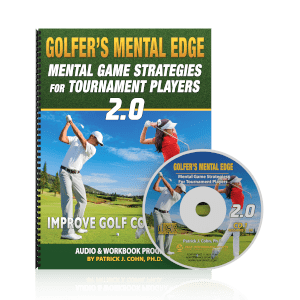
Stop Practicing When Your Compete
How many hours have you spent on practicing, refining, or overhauling your mechanics? In golf, you can get so wrapped up in wanting to perfect your mechanics that it overshadows the goal of shooting your lowest score.
You probably think tinkering with your mechanics leads to consistently shooting low scores, but that’s not always the case. Of course, if you have horrible mechanics, the ball will land all over the course instead of your intended target.
But trying to take the perfect swing leads to overthinking, over analyzing, and under performing.
Play good golf, once your practice is complete, happens when you have trust in your skills, trust in your preparation, and have confidence in your ability…
Trust is the mental skill that is essential to play your best golf. In our Mental Game of Golf Survey, a collegiate golfer asked the following:
“How can I improve my consistency? I work on my mechanics constantly and have worked with several swing coaches. I put in the work, but I am frustrated that my focus on mechanics has not paid off.”
The mechanics approach you have been taking is a similar approach adopted by many other golfers. You revamped your swing to drive the ball further on tee shots. You sought out advice from many swing coaches to improve your short game. You tinkered with different putters, grips, and mechanics.
When you entered a golf tournament, you kept reminding yourself of everything you had worked on in practice. You talked yourself through each shot.
However, you quickly became frustrated when you made bad shots. You analyzed your mechanics to correct your swing for the next shot. Your efforts to think yourself through each swing resulted in added strokes, furthering your frustration.
The goal of perfect mechanics prevents you from swinging the club freely. When you play golf swing on the course, you take the focus away from the strategy for each shot. You become more concerned with mechanics than just playing golf.
Trust in your game allows you to swing the club freely and play your best golf.
Anyway, if you had the choice between perfect mechanics or a low score, which would you choose?
Charles Howell III, 42, is quite an accomplished and consistent golfer. Howell has made 461 cuts and 227 top-25 finishes during his PGA Tour career. In addition, Howell won three PGA titles (2002 Michelob Championship, 2007 Nissan Open, and 2018 RSM Classic). The 2022 Waste Management Phoenix Open was Howell’s 600th PGA Tour tournament.
Howell commented on the effects of an over focus on mechanics over trusting and immersing yourself in just playing the game.
HOWELL: “I think there were times in my career that I kind of forgot the goal of the game was to shoot the lowest scores as opposed to the goal was always to be working on something. There are times that I would be working on something on my golf swing and spend six hours on the driving range hitting 5-irons, and then you get to a golf tournament, and you realize, ‘hang on here, I need to shoot the lowest score.'”
Everyone agrees on the need for sound swing mechanics. Hopefully, you now see the problems with focusing too much on mechanics and the need to develop the mental skill of trust.
How to Improve Trust in Your Golf Swing
Adopt the following strategy in your training. When you go to the driving range, hit half of the balls working on your drills and mechanics. The other half, hit each ball as if you were playing a round. Switch clubs and targets often, and include your preshot routine you use on the golf course.
Instead of grinding on mechanics the entire practice session, you want to spend time playing golf shots.
Related Golf Psychology Articles
- Mental Techniques to Trust Your Swing
- How to Build Trust in your Golf Game
- 4 Steps to Gain Trust in Your Golf Strokes
- Subscribe to The Golf Psychology Podcast on iTunes
- Subscribe to The Golf Psychology Podcast on Spotify
Golfer’s Mental Edge 2.0

Do you suffer from fragile self-confidence after missed hitting shots or making mistakes, playing with strict or high expectations that undermine confidence, or the inability to play freely and relaxed on the course?
Successful golfers have learned how to perform with ultimate confidence in competition, so we’ve developed The Golfer’s Mental Edge 2.0 Workbook and Audio program to help you do this!
The Golfer’s Mental Edge 2.0 program includes the top 11 mental training sessions I do with my personal students to help them boost their mental game and improve consistency on the course!